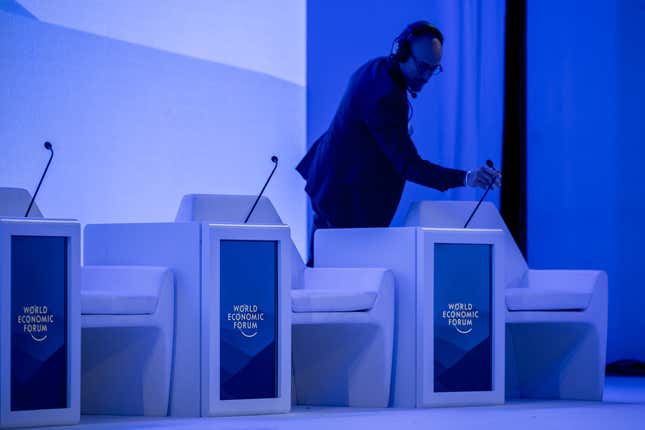
A version of this article originally appeared in Quartz’s Need to Know: Davos newsletter. To get updates on the World Economic Forum delivered straight to your inbox, sign up here.
After a week dominated by President Donald Trump’s shadow and tariff tensions, Davos 2025 wrapped up with a subdued final day, giving the world’s elite a chance to catch their breath and focus on the broader picture.
One of the final panels brought together the world’s top economic voices for a reality check. BlackRock CEO Larry Fink pushed back against European pessimism, saying that “the economy is larger than any one political party.” European Central Bank President Christine Lagarde pointed to Europe’s “huge potential” in GDP, talent, and savings, urging leaders to “respond to this wake-up call and existential threat.”
Both Lagarde and IMF chief Kristalina Georgieva emphasized AI’s crucial role in growth. “Make sure that artificial intelligence is not a privilege of few,” Georgieva urged. Lagarde said that AI’s potential is “huge,” but that it must “improve the state of the world, for all of us.”
Georgieva also zeroed in on productivity as the key differentiator between U.S., European, and emerging market growth. Her prescription for lagging regions? “Capital has to have long legs and go where it makes the biggest difference,” she said, with a particular call for Europe to deepen its capital markets.
All of these themes echoed through the week at the World Economic Forum: Europe’s challenges and potential, AI’s promise and perils, and the ever-present question of American influence. The gathering’s official theme, “Collaboration for the Intelligent Age,” took on new meaning with each passing day.
Monday opened with European leaders defending democracy and climate action against Trump’s America First agenda. By midweek, his virtual appearance laid out a second-term vision from tariffs to his $500 billion “Stargate” AI project, while Meta’s moderation retreat and Spain’s call for digital ID requirements highlighted the growing rift over tech governance.
NATO chief Mark Rutte surprised many by embracing Trump’s Russia stance, while WTO head Ngozi Okonjo-Iweala urged everyone to “chill” about tariffs. Even JPMorgan’s Jamie Dimon and Norway’s sovereign wealth fund chief agreed on one thing: Trump’s return was awakening Wall Street’s “animal spirits.”
Through it all, one message remained clear: Whether it’s AI access, trade policy, or capital markets, the push-and-pull between cooperation and competition will define 2025 — Trump’s version of it, anyway.